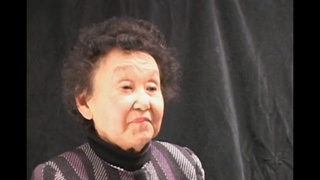Interviews
Choice to move east or go to Japan
The government said, I think United States and Canada knows Japan's gonna be... so before that, if you want to stay in Canada, move to east. Unless if you're gonna go Japan, you stay in Tashme. So the family in Tashme, we're the one family moved east. We're the first one, because when we moved, that day, it was a German was... so we were scared if a soldier saw us in the train, what... so Bob said, Just keep quiet, what they say everything, just keep quiet. Don't talk to them. But they didn't bother us. You know, they think we're Indian or something. [Laughs]
I*: How, how was the decision, because you could go to, I mean, the government will pay you to go to Japan, or move east. There was, how was that decision made?
Oh, yes, my father-in-law wants to go back to Japan. Of course, he was the oldest in the family, but I thought the younger one -- of course Miyoko speak Japanese and English both. But the others doesn't know how to speak Japanese. So I said, How could you take these girls to Japan? Well, good thing we didn't. Afterwards, we heard that they haven't got enough food, even the oldest family, my father-in-law was. You know, we haven't got the money. If you have lots of money to take to Japan is a different story. But those days, who got it, that kind of money? Especially we have to evacuate from their hometown and everything. So well, good thing we moved.
* "I" indicates an interviewer (Peter Wakayama).
Date: February 14, 2005
Location: Toronto, Canada
Interviewer: Peter Wakayama
Contributed by: Sedai, the Japanese Canadian Legacy Project, Japanese Canadian Cultural Center
Explore More Videos

Family background of Fredrick Yoshihide Sasaki
(b. 1918) Issei businessman in Canada

Anti-Japanese sentiment at the time of World War II
(b. 1918) Issei businessman in Canada


Four sisters had international marriages (Japanese)
(b. 1937) A war bride from Yokohama

Family life in a Japanese Canadian internment camp in Slocan
(b. 1920) Incarcerated during World War II. Active member of the Japanese Canadian community

The reason to stay in Japan after his third year
Japanese American Creative designer living in Japan

Getting a job at the British Army camp in Hiroshima
(b.1924) Japanese Canadian Nisei. Interpreter for British Army in Japan after WWII. Active in Japanese Canadian community

Lack of political power led to camps
(1924-2018) Researcher, Activist

Redress Movement in Canada
(b.1924) Japanese Canadian Nisei. Interpreter for British Army in Japan after WWII. Active in Japanese Canadian community


Institutionalization as a bad aspect of camp
(1924-2018) Researcher, Activist

State Department records show concern for treatment of Japanese American internees
(1924-2018) Researcher, Activist

Remembering December 7, 1941
(1923-2011) Lawyer, MIS veteran, founder of Francis and Sarah Sogi Foundation

Meeting Japanese Americans from the mainland in MIS
(1923-2011) Lawyer, MIS veteran, founder of Francis and Sarah Sogi Foundation

Awareness of concentration camps as a Japanese American
(1923-2011) Lawyer, MIS veteran, founder of Francis and Sarah Sogi Foundation
